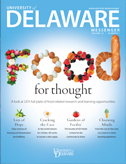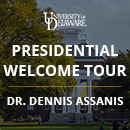
The UD Legacy
A legacy of farming, agriculture and UD
ALUMNI & FRIENDS | There are the legacies of families—of grandparents, parents, siblings and cousins—with deep Blue Hen roots. And then there are legacies of another sort. Of values and traditions, of a way of life that is preserved, enhanced and, at times, intrinsically tied to UD. Christy Vanderwende Wright, ANR01, has a story that’s a bit of both.
As an active member of her local Sussex County, Delaware 4-H and FFA programs, Christy was no stranger to UD, often visiting the campus and the College of Agriculture and Natural Resources (CANR) for state conventions and various youth agricultural activities. And when she didn’t make it to campus, the campus came to her, with Cooperative Extension agents—who provide education, research and outreach to state farmers, homeowners, businesses and more—often visiting her father’s farm to help diagnose a problem with produce or insects.
And then there was her Blue Hen heritage—her aunt, Carla Killmon, ANR80, and Christy’s father, Daniel Vanderwende, ANR74, who called his time at UD some of the best years of his life. When it was time to choose a university, Wright followed suit, enrolling as an agricultural business major. (Years later, her cousins Dusti Vanderwende Small, ANR07, and Wendee Killmon Bull, ANR10, would do the same).
It’s perhaps no surprise that the alumna bleeds Blue and Gold.
“I learned so much during my time at UD,” says Christy, who continues to volunteer for her family’s farm while working full-time for the Delaware Department of Public Health. “I could not have received a better education.”
Her husband shares a similar connection to UD and the “ag school,” as it’s affectionately called. “Newark always felt like the big city,” says Scott Wright, ANR94, who would often visit CANR as a high school student in 4-H and FFA, taking in UD football games and tours of the University’s 350-acre farm in between the scheduled youth activities. “But it also felt like home.”
Once he enrolled at UD as a freshman, CANR offered him the firsthand experience of working with dairy, livestock, crops and poultry on a large scale. And beyond the classroom, there was the agriculture fraternity Alpha Gamma Rho, Animal Science Club, Ag Ambassadors, Ag Council and Collegiate FFA—all of which he joined, creating a social and professional network to last a lifetime.
“UD was about the people,” says Scott, who works as an animal health inspector for the Delaware Department of Agriculture. “And CANR being a small college made that community incredibly special.”
That small community also drew fellow alumni and friends, Scott Webb, ANR94, and Elaine Zeitler Webb, ANR95, who now live five miles down the road from Scott and Christy.
Interestingly, Christy Wright’s grandfather and Scott Webb’s father are cousins. And the Webbs’ UD story is not far removed from the Wrights.
Scott Webb, too, grew up on a farm—the 1,000-acre Leaview Farm in Greenwood, Delaware, which his grandfather purchased in the 1940s, and where he continues the Webb legacy of tilling the fields for wheat, barley, corn and soybean, and raising 100,000-plus chickens.
“I’m a farm wife and we’re raising our kids on a farm,” says Elaine, who works for the State of Delaware’s soil sediment program and has served for the last 10 years as organizational leader for the Peach Blossom 4-H club (once operated by Christy Wright’s grandparents).
Sharing agriculture with her children—and the many more in the 4-H program—is vital, she adds. “They know more about where their food comes from than some very intelligent people I meet every day.”
Like the Wrights, the Webbs’ story—of farming roots that continue to flourish and grow—has come full circle, having been shaped, somewhere in between, by their time at UD.
“UD was familiar because of the 4-H connection, and it seemed perfect,” says Elaine. “I didn’t want to go anywhere else.”
Both she and her husband chose to study agriculture at UD because of the in-state cost and educational value. What they didn’t expect to get, at least at the time, was the vast group of friends and professional contacts.
Scott Webb recounts a recent presentation for the state’s Nutrient Management Commission, where he serves as poultry representative. “I get to the meeting, and the main speaker is Jim Glancey,” he says of the UD bioresources engineering professor. “He was a brilliant advisor and professor who really cared about his students. And it was great to see him and hear from.”
It’s that community—and agricultural network—that UD helps preserve.
“The people I met, the faculty I learned from, the classes I had—that’s what made UD so special,” says Scott Webb, who graduated alongside Scott Wright, and remains in touch with many of his classmates and colleagues. “The people we went to college with are family to us.”



